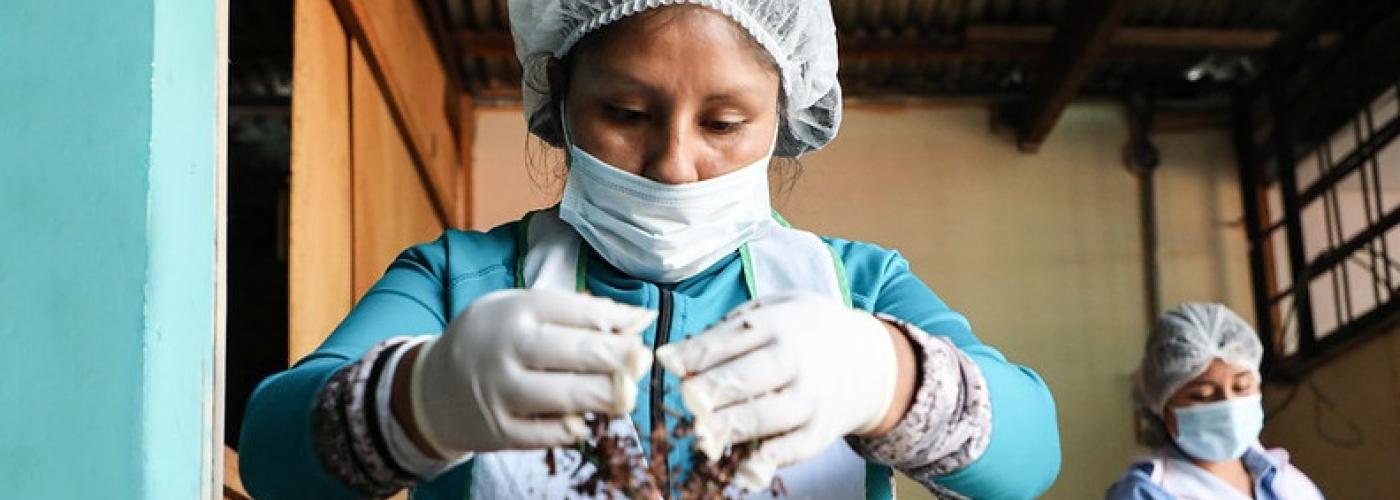Cooperative Business Solutions Support Economic Resilience of Incarcerated Women in Peru
Image

This article first appeared in NCBA CLUSA’s Co-op Weekly Newsletter and has been updated for MarketLinks.
“We are mothers, we are daughters, and we are human beings” proclaimed Roxana, a proud member of the Dulce Esperanza chocolate-producing women’s group in Quillabamba, Peru. Roxana is also an inmate at the women’s penitentiary of Quillabamba serving a 10-year sentence. In fact, all 40 members of Dulce Esperanza are prisoners at the women’s penitentiary. Most of these women come from poor communities and committed the crime of transporting cocaine from the countryside to the city—some unknowingly—and in general, in exchange for very little money. Many of them are now serving over 10-year sentences. The women’s penitentiary in Quillabamba supported the inmates in starting the Dulce Esperanza group to produce chocolate to generate income for their children while they are incarcerated. The women of Dulce Esperanza want to professionalize and expand their business and become cooperative but need additional training and technical assistance. This is when USAID’s Cooperative Development Program (CDP) was called upon.
As a CDP implementer in Peru, the National Cooperative Business Association CLUSA International (NCBA CLUSA) started a partnership with the National Penitentiary Institute (INPE) and the National Commission for Development and Life without Drugs (DEVIDA) in 2021 to train Dulce Esperanza on the cooperative model and other business, marketing, and financial management topics. Given the prison’s security policy, NCBA CLUSA was well-positioned to provide this technical assistance through its virtual Coop Marketing School, which the CDP project started in Peru during the COVID-19 pandemic’s lockdown periods. The women of Dulce Esperanza learned how to better administer their finances, avoid debt, and develop a culture of saving to improve their quality of life. In addition to understanding how to manage personal finances, training also focused on financial planning and governance and management for their group business.
Through the CDP, NCBA CLUSA also helped the women’s group improve their packaging and sell their chocolates at the 2021 FICAFÉ international coffee fair, which was serendipitously hosted in Quillabamba from October 28-31, 2021. NCBA CLUSA’s CDP continues to help facilitate market linkages for Dulce Esperanza. For example, an exciting new partnership has formed between Dulce Esperanza and COCLA Cooperative Union, also based in Quillabamba. COCLA has agreed to help the women’s group scale up their chocolate production using COCLA’s facilities and will start selling the chocolate in the cafeteria they manage in Cusco.
The CDP also connected Dulce Esperanza with Thika Thani, a Peruvian market that sells products in brick-and-mortar locations in Lima and online. Thika Thani will soon be stocking its shelves and online platform with Dulce Esperanza chocolate.
As Dulce Esperanza gains momentum, the women have become more intent on incorporating their business as a cooperative, not only to provide income for their families while they are imprisoned but also to provide economic stability and opportunity once they are released. In addition to supporting the cooperative registration process, the CDP will continue to train Dulce Esperanza on branding, packaging design, marketing, and cooperative management topics through the Coop Marketing School. Now with approval from prison authorities, the CDP will also provide in-person technical assistance and psychosocial counseling.
Prison culture can dehumanize people, but through its Productive Prisons Program, INPE has worked hard to preserve the humanity of their inmates and provide opportunities for them to contribute to their families’ economic well-being even while incarcerated. Through Dulce Esperanza, the women of Quillabamba Penitentiary have harnessed their entrepreneurial spirit and shown tremendous resiliency in the face of major challenges. With USAID CDP support, they are continuing their journey to becoming cooperative business owners and members, uplifting each other and their families from within and outside prison walls.
This post comes from an implementer of the Cooperative Development Program under USAID’s DDI LFT Bureau.

